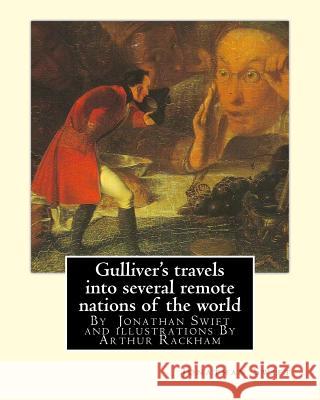Gulliver's travels into several remote nations of the world, By Jonathan Swift: and illustrations By Arthur Rackham (19 September 1867 - 6 September 1 » książka
Gulliver's travels into several remote nations of the world, By Jonathan Swift: and illustrations By Arthur Rackham (19 September 1867 - 6 September 1
ISBN-13: 9781536806113 / Angielski / Miękka / 2016 / 164 str.
Gulliver's travels into several remote nations of the world, By Jonathan Swift: and illustrations By Arthur Rackham (19 September 1867 - 6 September 1
ISBN-13: 9781536806113 / Angielski / Miękka / 2016 / 164 str.
(netto: 36,11 VAT: 5%)
Najniższa cena z 30 dni: 37,81
ok. 16-18 dni roboczych
Dostawa w 2026 r.
Darmowa dostawa!
Travels into Several Remote Nations of the World. In Four Parts. By Lemuel Gulliver, First a Surgeon, and then a Captain of Several Ships, commonly known as Gulliver's Travels (1726, amended 1735), is a prose satire by Irish writer and clergyman Jonathan Swift, that is both a satire on human nature and the "travellers' tales" literary subgenre. It is Swift's best known full-length work, and a classic of English literature.The book became popular as soon as it was published. John Gay wrote in a 1726 letter to Swift that "It is universally read, from the cabinet council to the nursery."The book begins with a short preamble in which Lemuel Gulliver, in the literary style of the time, gives a brief outline of his life and history before his voyages.Part I: A Voyage to Lilliput-- During his first voyage, Gulliver is washed ashore after a shipwreck and finds himself a prisoner of a race of tiny people, less than 6 inches (15 cm) tall, who are inhabitants of the island country of Lilliput. After giving assurances of his good behaviour, he is given a residence in Lilliput and becomes a favourite of the court. From there, the book follows Gulliver's observations on the Court of Lilliput. He is also given permission to go around the city on condition that he must not harm their subjects. Gulliver assists the Lilliputians to subdue their neighbours, the Blefuscudians, by stealing their fleet. However, he refuses to reduce the island nation of Blefuscu to a province of Lilliput, displeasing the King and the court. Gulliver is charged with treason for, among other crimes, "making water" in the capital, though he was putting out a fire and saving countless lives. He is convicted and sentenced to be blinded, but with the assistance of a kind friend, he escapes to Blefuscu. Here he spots and retrieves an abandoned boat and sails out to be rescued by a passing ship, which safely takes him back home.Part II: A Voyage to Brobdingnag, Part III: A Voyage to Laputa, Balnibarbi, Luggnagg, and Glubbdubdrib, Part IV: A Voyage to the Country of the Houyhnhnms. Arthur Rackham (19 September 1867 - 6 September 1939) was an English book illustrator. Rackham was born in Lewisham, then still part of Kent as one of 12 children. In 1884, at the age of 17, he was sent on an ocean voyage to Australia to improve his fragile health, accompanied by two aunts.At the age of 18, he worked as a clerk at the Westminster Fire Office and began studying part-time at the Lambeth School of Art. Jonathan Swift (30 November 1667 - 19 October 1745) was an Anglo-Irish satirist, essayist, political pamphleteer (first for the Whigs, then for the Tories), poet and cleric who became Dean of St Patrick's Cathedral, Dublin.Swift is remembered for works such as Gulliver's Travels, A Modest Proposal, A Journal to Stella, Drapier's Letters, The Battle of the Books, An Argument Against Abolishing Christianity and A Tale of a Tub. He is regarded by the Encyclopaedia Britannica as the foremost prose satirist in the English language, and is less well known for his poetry. He originally published all of his works under pseudonyms - such as Lemuel Gulliver, Isaac Bickerstaff, Drapier's Letters as MB Drapier - or anonymously. He is also known for being a master of two styles of satire, the Horatian and Juvenalian styles.His deadpan, ironic writing style, particularly in A Modest Proposal, has led to such satire being subsequently termed "Swiftian.."............
Zawartość książki może nie spełniać oczekiwań – reklamacje nie obejmują treści, która mogła nie być redakcyjnie ani merytorycznie opracowana.











